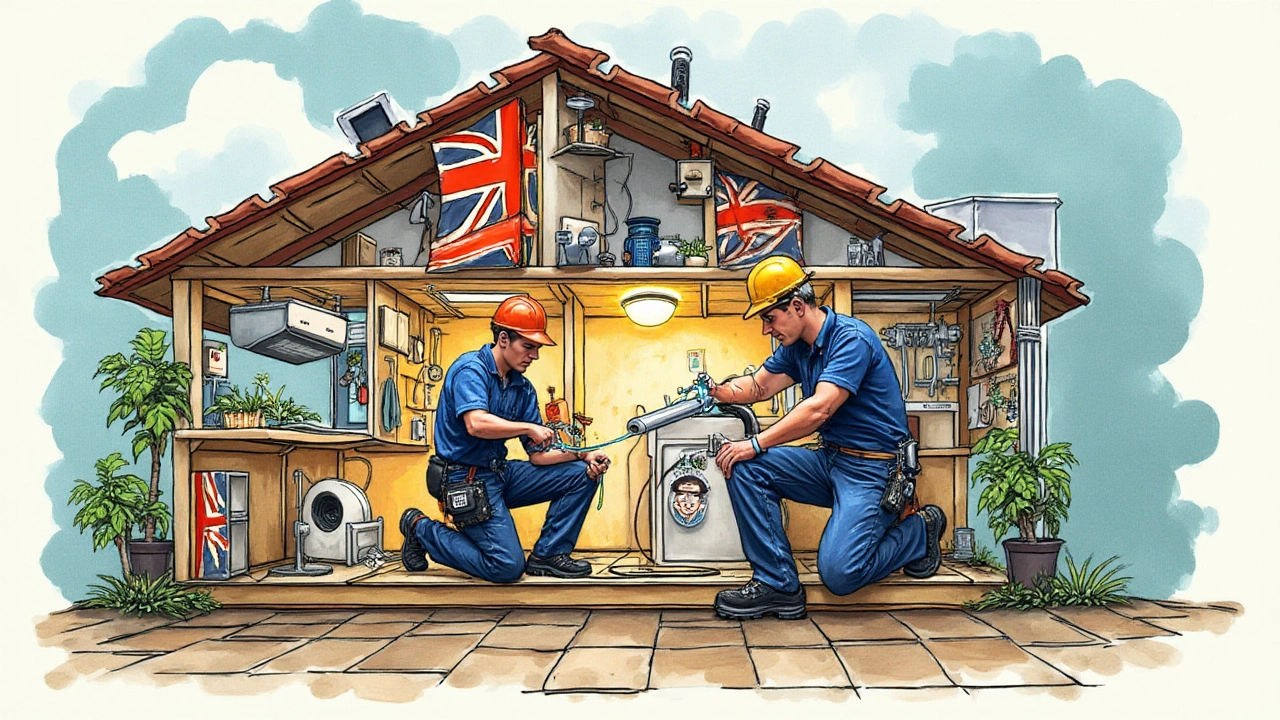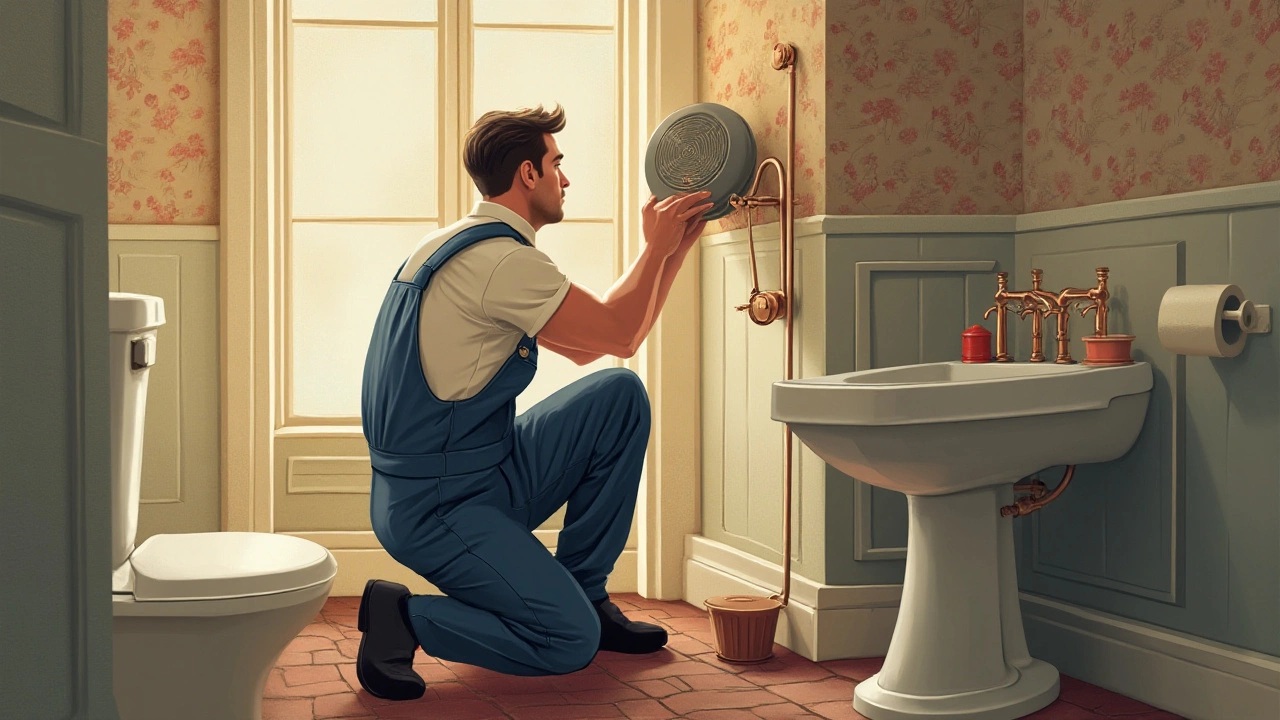When we think of plumbers, we tend to envision professionals expertly fixing our leaking faucets and ensuring our bathrooms function smoothly. But, is it within their realm of expertise to install extractor fans? It's not as straightforward as you might think. In many cases, knowing who to call depends on understanding the unique skills each trade requires.
Extractor fans, essential for maintaining good air quality by removing moisture and odors, often necessitate both knowledge of electrical systems and a keen understanding of structural nuances. This intersection of skills opens an interesting dialogue about the role of plumbers in this task. Can they do it, or should you call another specialist?
Before making that call, consider the specifics of the job at hand. Dive into knowledge to see how the lines blur between plumbing tasks and electrical work, and understand the factors to keep in mind to avoid running into frustrations or unforeseen problems.
- Understanding Plumbers' Expertise
- When a Plumber Can Install Extractor Fans
- Essential Considerations for Installations
- Choosing the Right Professional
Understanding Plumbers' Expertise
Plumbers, those indispensable maestros of our water systems, are revered for their ability to ensure seamless water flow and resolve myriad plumbing issues. While their primary role is clear, the scope of their skills can occasionally extend to other realms, including the installation of household devices like extractor fans. In this context, it’s crucial to dissect what lies at the core of a plumber’s expertise and when it might overlap with other trades.
Core Skills and Responsibilities
At the heart of their profession, plumbers engage in the installation, maintenance, and repair of piping systems and fixtures in various settings—residential and commercial alike. Their work involves ensuring the safe delivery of water and the effective disposal of waste water. Familiarity with materials such as copper, PVC, and galvanized steel is typical, and these professionals are adept at navigating the intricacies of water pressure and leakage.
Beyond the Basics: Hidden Expertise
While their primary tasks revolve around water systems, more seasoned plumbers may possess knowledge of basic electrical systems, especially when involved in modern solutions like boilers or smart plumbing systems. This supplementary skill set can sometimes make plumbers versatile candidates for tasks requiring minor electrical input, such as replacing certain types of extractor fans.
The Overlap with Electrical Work
It's worth mentioning that installations like extractor fans—particularly those integrated into bathroom plumbing systems—often demand a hybrid skill set comprising both plumbing and electrical knowledge. Some older homes might have plumbing systems that require creative solutions to replace older fans without extensive electrical work, allowing a plumber's ingenuity to shine. However, it’s crucial to verify whether the plumber in question holds the necessary certification for handling electrical components legally and safely.
Certification and Regulation
Plumbing, as with any skilled trade, involves its own unique set of regulations and potential licensing requirements. In regions like the UK, plumbers frequently possess NVQ (National Vocational Qualification) credentials, while others might pursue related certifications in HVAC and electrical subsystems given their varied utility in comprehensive home renovations.
Overall, while plumbers are not typically synonymous with sophisticated electrical installations, understanding their core competencies and potential crossover skills can make a world of difference when strategizing a home improvement project. Knowing when to leverage a plumber's unique blend of skills can lead to efficient and cost-effective solutions, especially in scenarios that call for both plumbing adjustments and basic electrical inputs.
When a Plumber Can Install Extractor Fans
While it's often assumed that the installation of extractor fans is strictly within the domain of electricians, there are circumstances where a plumber's expertise may come into play. Understanding these scenarios could save time and ensure your ventilation system is installed correctly.
Overlap Between Plumbing and Electrical Work
Extractor fans in bathrooms and kitchens require careful consideration of both electrical and plumbing systems. In situations where a bathroom extractor fan installation involves integration with existing ductwork or venting through plumbing stacks, a plumber's skills become invaluable. They have the knowledge to handle the intricacies of venting moisture-laden air efficiently through designed paths.
Specific Scenarios for Plumber Involvement
Here are some situations where hiring a plumber for your extractor fan installation might be beneficial:
- When the extractor fan needs to be installed in a wet area, like above a shower, where water-tight seals and moisture-resistant materials are crucial.
- In older homes where plumbing systems are intertwined with ventilation ducts, requiring adjustments to both systems for optimal performance.
- When replacing an old fan with a new one, especially if modifying existing ductwork connections is necessary.
A comprehensive understanding of these systems can ensure that the plumbing and ventilation work in harmony without causing damage or violating building codes.
Licensing and Expertise
In many regions, plumbers possessing additional certifications in HVAC (Heating, Ventilation, and Air Conditioning) can legally handle both the electrical and ductwork aspects of installation, providing a one-stop solution for homeowners. It's wise to inquire about a plumber’s specific qualifications and previous experience in handling such installations before proceeding.
Final Considerations
The choice between hiring a plumber or an electrician may also depend on job complexity and local regulations, which can vary significantly. Consulting both professionals can often provide clarity, ensuring that your extractor fan is not just effectively installed but also maintained for long-term functionality.

Essential Considerations for Installations
Embarking on the task of installing an extractor fan isn't merely a plug-and-play operation. It requires careful planning, skill, and knowledge to avoid common pitfalls. Whether you're considering doing it yourself or hiring a professional, several crucial factors will influence the success of the installation.
Assess the Location
One of the most vital steps before installing an extractor fan is assessing the location. The fan needs to effectively ventilate specific areas, commonly kitchens and bathrooms, where humidity levels soar. Ensuring proper placement can maximize efficiency and prevent moisture accumulation that encourages mold growth.
Understand Building Regulations
Before breaking out the tools, it’s important to familiarize yourself with relevant building codes and regulations. In some regions, specific installation requirements must be met, especially concerning electrical connections. Compliance can prevent potential legal issues and ensure a safe setup.
Consider Professional Expertise
While a determined DIY enthusiast might tackle an extractor fan installation, understanding the limitations of your own skill set is wise. If plumbing skills intersect with electrical requirements, employing the expertise of both a plumber and an electrician might be necessary. Consultation with a knowledgeable professional can identify potential issues you might overlook.
Plan for Proper Ventilation
The ventilation pathway demands attention. Route the exhaust through a direct path to the outside, minimizing bends and turns, which can cause airflow resistance. Depending on your property setup, this could mean drilling through brick walls or ceiling recesses, tasks best handled by someone experienced.
Cost Estimation and Budgeting
Determining the cost involves more than just the extractor fans themselves; factor in installation materials, potential structural modifications, and labor charges if hiring professionals. Crafting an accurate budget helps prevent unwelcome surprises, allowing projects to stay within financial limits.
Energy Efficiency
With sustainability a growing concern, consider the energy efficiency of the extractor fans. Opt for units with high efficiency ratings to cut down on long-term energy consumption, saving money and contributing positively to the environment.
The intricacies of installation are manifold, but by considering these essential factors and planning adequately, the outcome will likely be a functional, well-operating extractor fan that stands the test of time.
Choosing the Right Professional
Deciding between a plumber and another contractor for installing extractor fans isn't a simple task, as it involves understanding the overlapping skill sets of different trades. Typically, extractors demand both plumbing know-how, especially in kitchens and bathrooms, and electrical capabilities. Thus, choosing the right professional can save time and money while ensuring safety and quality.
Evaluating the Complexity of the Installation
If your installation involves mere replacement with no rewiring, a plumber might indeed handle the task. However, electrics come into play with new installations, requiring a qualified electrician. Many jurisdictions necessitate certified professionals for electrical work, ensuring compliance with safety regulations.
Plumber vs. Electrician: The Skills Overlap
While plumbers specialize in water systems, they often have a basic understanding of electrical safety, especially those involved in bathroom installations. However, an electrician's extensive expertise ensures installations adhere to the National Electrical Code (NEC) requirements.
- Plumbers: Ideal for replacements or fans integrated with plumbing systems like venting through existing ductwork.
- Electricians: Necessary for installations requiring new wiring or significant electrical updates.
Practical Tips for Selection
As part of your vetting process, ask for credentials and verify certifications. Inquire about prior experience in extractor fan installations to assess competence. Don’t shy away from seeking reviews or recommendations - a reputable professional should have positive endorsements.
- Check local regulations regarding electrical work to ensure compliance.
- Request a detailed estimate to prevent misunderstandings about costs and scope.
- A contract outlining responsibilities and service guarantees is essential to protect both parties.
Considering Cost and Availability
While cost shouldn’t be the sole factor, it’s crucial to account for budget constraints without compromising on expertise. Quotes can vary significantly between professionals. Often, local electricians offer competitive pricing for wired installations, valuing safety and compliance significantly.
In summary, understanding whether a plumber or an electrician is best suited for your extractor fan installation requires evaluating the specifics of your project, ensuring all involved work is performed by skilled, certified, and competent professionals.
